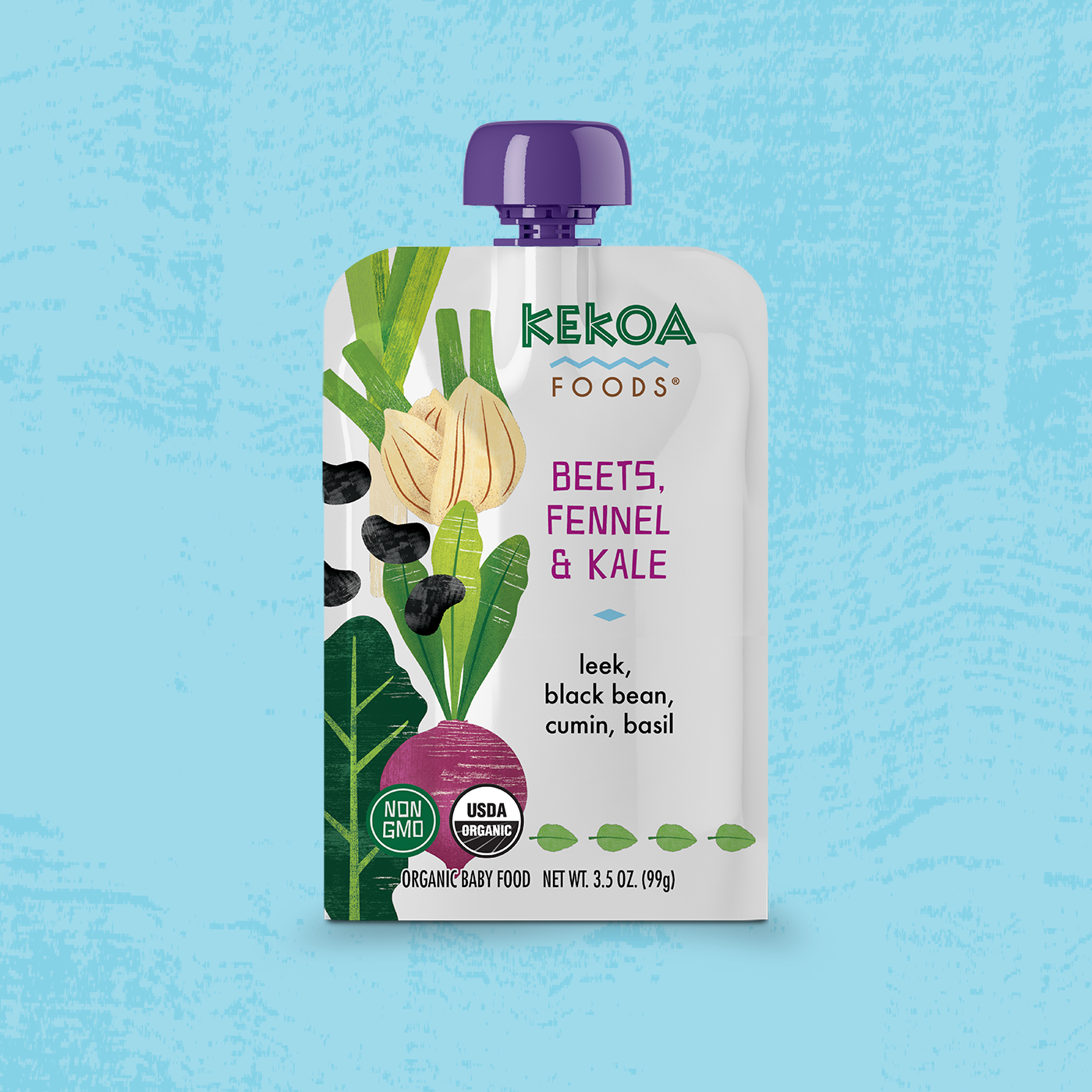
We're ditching the bland and embracing bold, organic flavors that spark your little adventurer's taste buds. It's not just about filling tiny tummies, it's about kickstarting a lifelong love affair with good food.
Buckle up, parents, because the first 1,000 days (from conception to age two) are a wild ride of brain development, immune system growth, and laying the groundwork for a healthy future. Organic baby food becomes your co-pilot in this incredible journey. But why choose organic?
Think of it as Building Blocks
We keep things clean so that your little one can avoid any ingredient that doesn’t serve them, meaning less exposure to pesticides and more flavorful, beneficial ingredients.
Exposing your little one to a rainbow of organic flavors early on is like sending them on a taste bud expedition. This adventurous spirit helps them develop a more open palate, setting the stage for a future filled with healthy and exciting food choices and not limiting them to bland, less nutritious options.
The First 1,000 Days: A Window of Opportunity
The period from conception to age two, known as the first 1,000 days, is a crucial window for brain development, immune system function, and overall growth. During this time, your little one is rapidly learning and adapting, making proper nutrition an essential investment in their future health and well-being.
Organic Baby Food: Information Overload
Let’s discuss the elephant in the room for most first-time parents. With a wealth of information available at our fingertips digitally, comes mixed messages and information overload about what to feed our babies.
Mixed messaging and information overload can significantly impact parents' decisions about organic baby food. By critically evaluating sources, seeking professional advice, and focusing on balanced, evidence-based information, parents can navigate the complexities of these choices more confidently and make informed decisions that best suit their family’s needs.
Remember that personal anecdotes and advice from family and friends can be influential but may not always be based on scientific evidence. Websites, blogs, forums, and social media platforms provide a wealth of information but can also spread misinformation and conflicting opinions. And last but not least, companies use targeted marketing to promote their products, often highlighting certain benefits that might not be significant.
Organic: A Nourishing Choice
Organic baby food offers a number of benefits that contribute to a well-balanced diet for your infant or toddler. By choosing organic baby food, you're ensuring:
- Reduced Exposure to Harmful Chemicals
Organic baby food is produced without synthetic pesticides and herbicides, reducing your baby’s exposure to potentially harmful chemicals. Babies are more vulnerable to the adverse effects of these substances due to their developing bodies and systems.
Organic foods are free from artificial additives, preservatives, and colorings, which can be present in conventional baby foods. Avoiding these substances can help reduce the risk of allergic reactions and other health issues.
- Higher Nutritional Value
Some studies suggest that organic foods can have higher levels of certain nutrients, such as vitamins, minerals, and antioxidants, compared to their conventionally grown counterparts. This can be particularly beneficial for a baby’s growth and development.
Organic meat and dairy products often contain healthier fatty acid profiles, which are important for brain development in babies.
- Avoidance of GMOs
Organic baby foods are produced without genetically modified ingredients. While the long-term health impacts of GMOs are still being studied, some parents prefer to avoid them as a precaution.
- Better Taste and Quality
Organic foods are often fresher and can taste better because they are grown using methods that prioritize soil health and sustainable farming practices. Better-tasting food can make it easier to introduce a variety of healthy foods to your baby.
Organic baby food typically includes natural, whole ingredients, which can contribute to better overall quality and taste.
- Environmental Benefits
Organic farming practices are designed to be more sustainable and environmentally friendly. They promote soil health, conserve water, and reduce pollution. By choosing organic, you’re supporting practices that contribute to a healthier planet.
Organic farming also encourages biodiversity, which can help create more resilient ecosystems.
6. Supporting Organic Agriculture
By purchasing organic baby food, you’re supporting the organic farming industry and encouraging more farmers to adopt organic practices. This can lead to increased availability and variety of organic products in the market.
7. Fewer Allergens
By avoiding synthetic additives, preservatives, and pesticides, organic baby food may be less likely to trigger allergies and sensitivities in young children.
8. Improved Digestive Health
Organic foods are free from synthetic chemicals and artificial ingredients, which can be gentler on your baby’s developing digestive system. This can reduce the risk of gastrointestinal issues and improve nutrient absorption.
The use of organic and whole ingredients supports a healthier gut microbiome, which is crucial for your baby's overall health and immunity.
9. Developmental Benefits
Nutrients found in higher levels in organic foods, such as omega-3 fatty acids, are essential for brain development. Proper nutrition during infancy can lead to better cognitive development and function.
The vitamins, minerals, and other nutrients present in organic foods support healthy physical development, including bone growth, muscle development, and overall physical health.
Nourishing Adventures Start with Kekoa Foods
We believe in making healthy eating a fun and flavorful adventure. With our 100% organic ingredients and exciting flavor combinations, like Beets, Fennel & Kale or Curry Vegetable Mango, Kekoa Foods pouches are the perfect fuel for your baby’s first culinary discoveries.
Let's embark on this journey together, one delicious pouch at a time!
Beets, Fennel & Kale Squeeze Pouch, 100% Organic Vegetarian Baby Food Purée
We take vibrant red beets, add savory fennel and nutrient-dense kale, mix in some leeks and black beans for protein power, and season with basil and a touch of cumin to bring this tasty, colorful, nutritious blend to life!
Sources:
- American Academy of Pediatrics. (2012). "Organic Foods: Health and Environmental Advantages and Disadvantages." Pediatrics, 130(5), e1406-e1415. AAP Pediatrics
- Baranski, M., et al. (2014). "Higher antioxidant and lower cadmium concentrations and lower incidence of pesticide residues in organically grown crops: a systematic literature review and meta-analyses." British Journal of Nutrition, 112(5), 794-811. British Journal of Nutrition
- Benbrook, C. (2012). "Impacts of genetically engineered crops on pesticide use in the U.S. -- the first sixteen years." Environmental Sciences Europe, 24(1), 24. Environmental Sciences Europe
- National Organic Program. "Genetically Modified Organisms (GMOs)." USDA. USDA Organic
- Kummeling, I., et al. (2008). "Early-life exposure to antibiotics and the subsequent development of allergic diseases: a meta-analysis." Clinical and Experimental Allergy, 39(5), 1226-1235. Clinical and Experimental Allergy
- Evolutionary aspects of diet, the omega-6/omega-3 ratio and genetic variation: nutritional implications for chronic diseases." Biomedicine & Pharmacotherapy, 60(9), 502-507. Biomedicine & Pharmacotherapy
- Lu, C., et al. (2006). "Organic diets significantly lower children’s dietary exposure to organophosphorus pesticides." Environmental Health Perspectives, 114(2), 260-263. Environmental Health Perspectives

